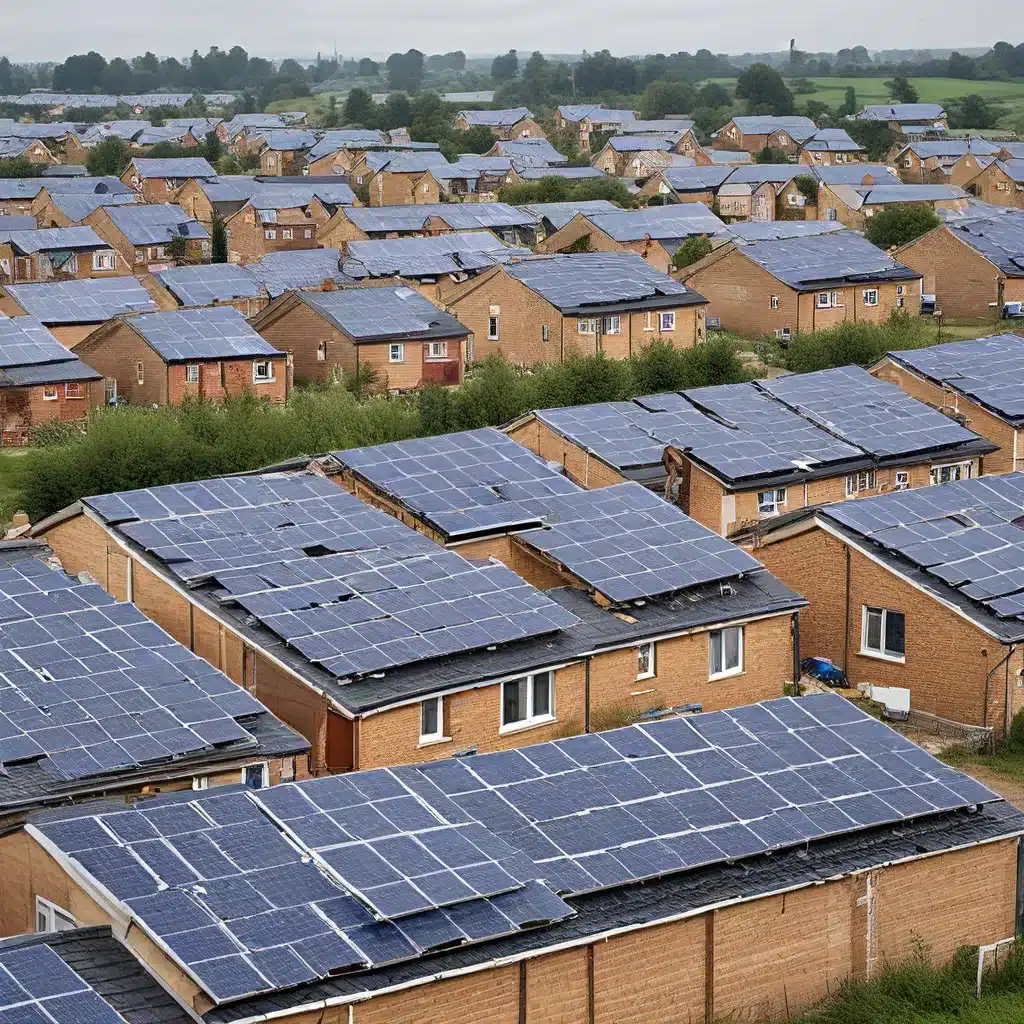
As someone passionate about renewable energy and social justice, I’ve long been fascinated by the intersection of these two crucial issues. And when it comes to tackling energy poverty in our communities, I believe renewable energy solutions hold immense promise.
Let me tell you, the statistics on energy poverty are pretty staggering. Did you know that in the EU, up to 35% of some member states’ populations are considered energy-poor? And across the pond in the US, nearly one-third of households struggle to pay their energy bills. That’s millions of people who can’t afford the basic household energy needs we all take for granted, like heating, cooling, and lighting.
It’s a problem that disproportionately affects low-income families, and one that has only been exacerbated by the COVID-19 pandemic and the recent surge in energy prices. But you know what? I believe renewable energy can be a game-changer in tackling this pressing issue.
Renewable Energy: A Pathway to Affordable, Sustainable Homes
Here’s the thing – renewable energy technologies like solar, wind, and geothermal have become increasingly affordable and accessible in recent years. And when you combine these clean power sources with energy-efficient building retrofits and construction, you’ve got a powerful solution for making homes more sustainable and, crucially, more affordable to run.
Take the Energiesprong initiative in the Netherlands, for example. This government-backed program has been retrofitting social housing to near-zero energy standards, with the renovation costs financed by the projected energy cost savings over 30 years. It’s a model that’s been replicated in other countries, and it’s showing just how effective renewable energy can be in tackling energy poverty.
Empowering Low-Income Households Through Renewable Energy
But renewable energy isn’t just about cutting energy bills – it’s also about empowering the people who need it most. Initiatives like the ComAct project in Central and Eastern Europe are working to make energy-efficiency improvements affordable and manageable for low-income families living in multi-apartment buildings. By engaging with and empowering homeowner associations, they’re helping these communities take control of their energy futures.
And in the US, the Low-Income Housing Tax Credit (LIHTC) program is a shining example of how government support can drive the integration of renewable energy and energy efficiency into affordable housing. This competitive fund has been yielding an annual average of 1,400 projects and 106,400 housing units since 1995, all with stringent energy-efficiency standards.
A Just Transition: Renewable Energy and Affordable Housing
You know, the more I delve into this topic, the more I see the critical link between renewable energy and affordable housing. It’s not just about cutting emissions and saving money – it’s about creating a more just and equitable society.
As Ted Toon, Director for Housing Efficiency at the White House’s Council on Environmental Quality, puts it: “Energy poverty is an issue at the intersection of housing, emissions, jobs, and environmental justice.” And that’s why initiatives like the Justice40 Initiative, which directs at least 40% of the overall benefits from federal investments in climate and clean energy solutions to disadvantaged communities, are so important.
Overcoming the Barriers to Renewable Affordable Housing
Now, I know what you might be thinking – if renewable energy is such a great solution, why isn’t it more widely adopted in low-income housing? Well, the truth is, there are still some significant barriers to overcome.
One of the biggest issues is the financialization of the housing market, where big property funds are outbidding affordable housing projects and seeing energy-efficient homes as an additional cost burden rather than a long-term investment. As Kim Van Sparrentak, Member of the European Parliament, puts it, “The priority is to enable the flow of money and ensure investment in Member States, and this is a barrier to the provision of affordable and sustainable housing.”
But there’s hope on the horizon. The European Commission’s Renovation Wave and the EU Social Climate Fund are just a couple of the initiatives that are actively supporting the renovation of the worst-performing buildings and tackling energy poverty. And in the US, the Low-Income Home Energy Assistance Program (LIHEAP) and the Weatherization Assistance Program are likely to expand as designated Justice40 pilot programs.
The Path Forward: Integrating Renewable Energy and Affordable Housing
So, what’s the way forward? Well, I believe it’s all about integrating renewable energy and affordable housing in a holistic, equitable way. We need to empower low-income households to take control of their energy futures, whether that’s through initiatives like Energiesprong or by ensuring that affordable housing projects meet stringent energy-efficiency standards.
And we need to tackle the underlying structural issues that are making it so difficult to provide affordable, sustainable housing, like the financialization of the housing market and the need for better coordination between energy and social policies.
It’s a big challenge, to be sure, but I truly believe that renewable energy holds the key to unlocking a more equitable, sustainable future for all. By investing in renewable-powered affordable housing, we can improve living conditions, reduce emissions, and empower the communities that need it most.
So, what do you say? Are you ready to be a part of the renewable energy revolution that’s transforming affordable housing and tackling energy poverty head-on? Because I, for one, am excited to see what we can achieve when we harness the power of clean energy to build a better world for everyone.
Firewinder is a leading provider of renewable energy solutions, helping families and communities access affordable, sustainable power. Check out our website to learn more about how we can help you power your affordable home and fight energy poverty in your community.

